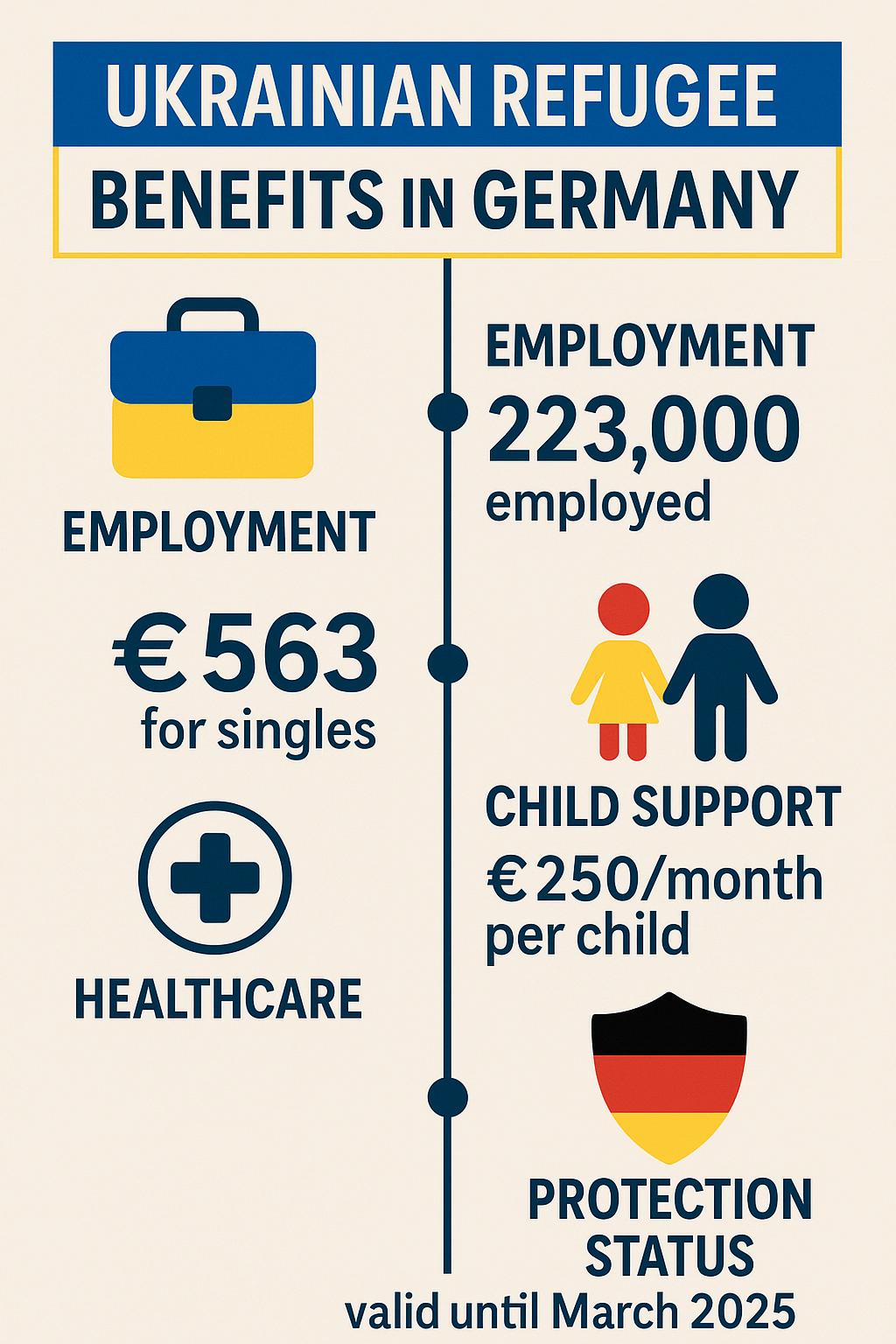Ukrainian refugees in Germany face a complex landscape of legal protections, employment opportunities, and social support systems designed to facilitate their integration and well-being. Understanding German work contracts and benefits is essential for Ukrainians seeking to establish stable lives in Germany while navigating the country’s comprehensive but sometimes intricate social security framework.
Key Takeaways
- Ukrainian refugees enjoy temporary protection status until March 2025, granting immediate work authorization without restrictions
- Eligible Ukrainians receive Bürgergeld benefits of €563 monthly for single adults, plus housing and heating costs
- Employment support includes job placement, qualification recognition, and free integration courses
- Families can access €250 monthly child benefits per child regardless of employment status
- Full access to German healthcare and psychological support is provided through statutory health insurance
Legal Status and Work Authorization
Ukrainian refugees in Germany receive protection under the EU Temporary Protection Directive (EU 2022⁄332), implemented through Section 24 of the German Residence Act (Aufenthaltsgesetz). This special protection status bypasses the standard asylum procedure, providing immediate legal residence and work authorization.
The initial registration process requires visiting the local immigration office (Ausländerbehörde) to obtain the formal residence permit. This status has been extended multiple times and currently runs until March 4, 2025, giving Ukrainians medium-term security and planning ability.

Understanding Bürgergeld Benefits
Since June 1, 2022, Ukrainian refugees have transitioned from receiving benefits under the Asylum Seekers’ Benefits Act to the standard German social security system called Bürgergeld (formerly Hartz IV). This significant upgrade provides more comprehensive support aligned with what German citizens receive.
The monthly standard rates include €563 for single adults, €506 for each adult partner in a relationship, and varying amounts for children depending on age. Additionally, the Jobcenter covers reasonable housing costs, including rent and heating, based on local market rates for your specific region.
To apply for these benefits, you’ll need to visit your local Jobcenter with several essential documents:
- Valid identification document (Ukrainian passport or ID card)
- Residence permit under Section 24
- Registration certificate (Meldebescheinigung)
- German bank account information
- Rental contract (if available)
Employment Support and Job Market Access
One of the most significant advantages of the temporary protection status is immediate access to the German labor market. Unlike other refugee groups, Ukrainians don’t face waiting periods or labor market testing requirements before accepting employment.
The Federal Employment Agency (Bundesagentur für Arbeit) offers comprehensive job placement services through local employment offices. These services include career counseling, vocational training opportunities, and assistance with job applications, all designed to facilitate labor market integration.
Recognition of Ukrainian qualifications plays a crucial role in successful employment. Germany has established streamlined recognition procedures for many Ukrainian professional degrees and certificates, particularly in regulated professions like healthcare, education, and engineering.

Language and Integration Support
Language acquisition represents a fundamental pillar of successful integration into the German job market. The Federal Office for Migration and Refugees (BAMF) offers free integration courses that include 600 hours of language instruction and 100 hours of orientation about German culture, history, and legal system.
For those focused on employment, specialized vocational language courses (Berufssprachkurse) provide sector-specific terminology and communication skills. These courses can be taken after completing the basic integration course or in parallel with job training.
Employers hiring Ukrainian refugees may qualify for an integration allowance (Eingliederungszuschuss), covering up to 50% of salary costs for up to 12 months. This financial incentive aims to increase employment opportunities and facilitate workplace integration.
Employment Statistics and Success Stories
The integration of Ukrainian refugees into the German labor market has shown encouraging progress. As of early 2024, approximately 223,000 Ukrainians have found employment in Germany, with numbers steadily increasing each quarter.
Many Ukrainians have successfully entered fields facing labor shortages in Germany, including IT, healthcare, and skilled trades. The housing certificate application process also helps refugees find suitable and affordable accommodation while establishing their careers.
Understanding German Work Contracts
German employment contracts typically come in written form and must specify key terms of employment. The essential components include job title and description, start date, working hours, probation period, salary, vacation entitlement, and notice periods.
Full-time work in Germany is generally based on 40 hours per week, though this varies by industry and collective agreements. German law mandates a minimum of 20 paid vacation days annually for full-time employees, though most employers offer between 25–30 days.
Employment contracts may be permanent (unbefristet) or fixed-term (befristet). Fixed-term contracts require specific justification if they exceed two years or are renewed more than three times. This protection against endless temporary contracts provides job security once the initial period passes.
Workers’ Rights and Protections
Ukrainian refugees enjoy the same labor rights as German workers, including minimum wage protection (currently €12.41 per hour), regulated working hours, and protection against unfair dismissal. German labor law also ensures strict workplace safety standards and anti-discrimination protections.
Employment termination in Germany follows specific notice periods that increase with length of service, starting at four weeks for new employees. During the probation period (typically six months), this may be reduced to two weeks. Unfair dismissal protection applies to companies with more than ten employees after six months of employment.
German workers enjoy strong collective bargaining rights through unions (Gewerkschaften), which negotiate sector-wide agreements covering wages, working conditions, and benefits. These collective agreements often provide more favorable terms than the legal minimum requirements.
Social Security and Tax Obligations
Working in Germany means participating in the social security system through mandatory contributions. Approximately 20% of your gross salary will be deducted for health insurance, pension insurance, unemployment insurance, and long-term care insurance, with employers matching these contributions.
Income tax (Einkommensteuer) is withheld directly from your salary based on a progressive scale. Your tax class (Steuerklasse) depends on your personal situation, with different classifications for single people, married couples, and families with children. Annual tax returns allow you to claim deductions and potentially receive refunds.
Ukrainian refugees should apply for a tax identification number (Steuer-ID) and social security number (Sozialversicherungsnummer) soon after arrival. These unique identifiers are essential for employment and ensure proper crediting of social security contributions.
Family Benefits and Child Support
Families with children qualify for child benefits (Kindergeld) of €250 per month per child, regardless of employment status or income level. This universal benefit supports all families and is paid until children reach age 18, or up to 25 if they continue education.
Low-income working families may qualify for an additional child supplement (Kinderzuschlag) of up to €250 per month per child. This income-dependent support aims to reduce child poverty while maintaining work incentives for parents.
The education and participation package (Bildungs- und Teilhabepaket) provides additional support for school-related expenses. This includes funding for school supplies, class trips, sports activities, and lunch subsidies, ensuring children can fully participate in educational and social activities.
Healthcare Coverage for Workers and Families
Employment in Germany provides access to the statutory health insurance system (gesetzliche Krankenversicherung), covering medical treatments, hospital stays, and prescription medications. Family members can be co-insured without additional cost if they don’t have their own income.
Ukrainian refugees with war-related trauma can access specialized psychological support services. These trauma-informed treatments are covered by health insurance and include therapy, counseling, and psychiatric care when needed.
People with disabilities receive additional support under Social Code Book IX (SGB IX), including workplace accommodations, rehabilitation services, and assistive technologies. These specialized provisions ensure equal participation in work and social life regardless of physical or mental limitations.
Challenges and Potential Obstacles
Despite comprehensive support systems, Ukrainian refugees may face barriers to employment integration. Language remains the primary challenge, as most positions require at least intermediate German skills, particularly in customer-facing roles and regulated professions.
The recognition process for professional qualifications can be time-consuming and complex. Some Ukrainian professionals face partial recognition requiring additional training or examination before full practice authorization, particularly in healthcare, legal, and educational fields.
Housing shortages in major cities present practical challenges for job mobility. Finding affordable accommodation near employment opportunities often requires strategic planning and potentially longer commutes or consideration of positions in smaller cities and towns.
Resources and Support Services
Numerous organizations provide specialized support for Ukrainian job seekers. The Ukrainian-German Chamber of Commerce, migration counseling centers, and Ukrainian community organizations offer targeted assistance with job applications, interview preparation, and networking.
Digital platforms like “Germany4Ukraine” and “Handbook Germany” provide comprehensive information in Ukrainian language. These centralized resources explain benefit entitlements, application procedures, and employment rights in accessible formats.
Local integration coordinators (Integrationsbeauftragte) can provide individualized support navigating employment systems. These municipal contacts often maintain lists of Ukrainian-speaking advisors and can recommend appropriate local services based on individual needs.
Sources
Federal Government Commissioner for Migration, Refugees and Integration: War in Ukraine
Federal Ministry of Labour and Social Affairs: FAQ for Ukrainian Refugees
Federal Office for Migration and Refugees: Information for Ukrainian Refugees
Federal Employment Agency: Ukraine Portal
Handbook Germany: Ukraine Information

